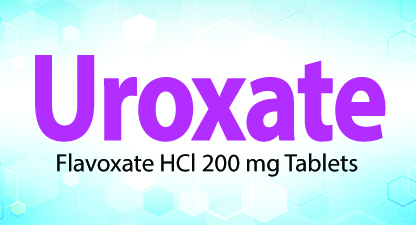UROXATE
Flavoxate is an anticholinergic with anti-muscarinic effects. Its muscle relaxant properties may be due to a direct action on smooth muscle rather than by antagonizing muscarinic receptors.
- Categories : Urinary Tract Spasmolytic
- Share Now :
When you want relief, always choose the best….
UROXATE
Generic Name: Flavoxate HCl
Therapeutic Category: Urinary tract spasmolytic
Pharmacological Class: Phosphodiesterase inhibitor
Composition: Each film coated tablet contains Flavoxate HCl BP 200 mg.
Pregnancy Category: B
Presentation: Available in the pack size as 10 tablets X 10 blisters
Mechanism of Action
UROXATE exerts a direct relaxant effect on smooth muscles via phosphodiesterase inhibition, providing relief to a variety of smooth muscle spasms. This counteracts smooth muscle spasms of urinary tract.
Indications
- Urinary frequency & incontinence*
- Cytoscopy*/surgery
- Urethrocystitis*/urethrotrigonitis*
- Bladder spasms due to catheterisation
- Urinary urgency
- Symptomatic relief of dysuria
- Nocturia*
- Cystitis
- Urethritis
- Suprapubic* pain
- Dysuria
- Prostatitis
Dosage
Route of administration: Oral
Children <12 years: Not recommended; safety and efficacy not established
Children ≥12 years: 100-200 mg PO q6-8hr
18 years and older: 200 mg orally 3 to 4 times daily
Medication to be taken after meals.
Pharmacokinetics
Absorption: Well absorbed from gastrointestinal tract.
Protein binding: Approximately 90%
Metabolism: Hepatic (rapid metabolism)
Route of elimination: Urine (50-60%)
Half-life: 2-3 minutes
Adverse Effects
UROXATE is generally well tolerated, but can potentially cause, vomiting, upset stomach, dry mouth or throat, blurred vision, eye pain, and increased sensitivity of your eyes to light.
Contraindications
UROXATE is contraindicated in the following conditions:
- Obstructive conditions: pyloric or duodenal obstruction, obstructive intestinal lesions or ileus, achalasia, gastro-intestinal hemorrhage and obstructive uropathies of the lower urinary tract.
- Hypersensitivity to Flavoxate hydrochloride or to any of the excipients of Uroxate.
Precautions
UROXATE must be used cautiously in:
- Patients with suspected glaucoma, especially closed angle cases
Interactions
 No data regarding the interactions of Flavoxate (HCl) was found.
No data regarding the interactions of Flavoxate (HCl) was found.


